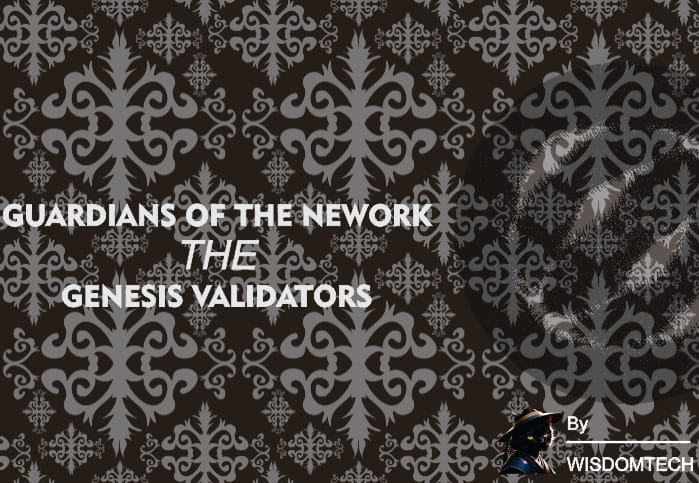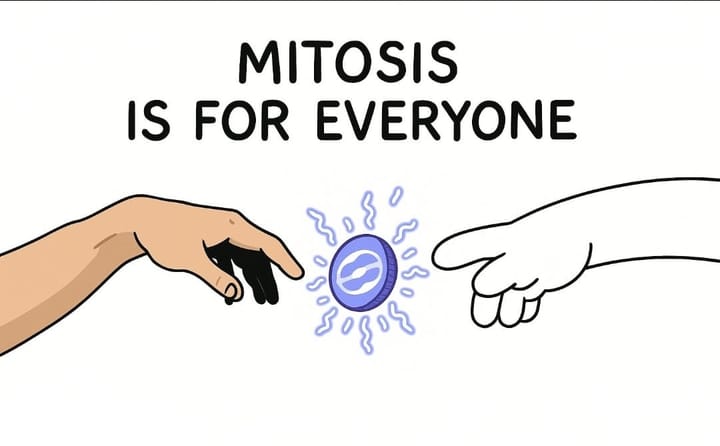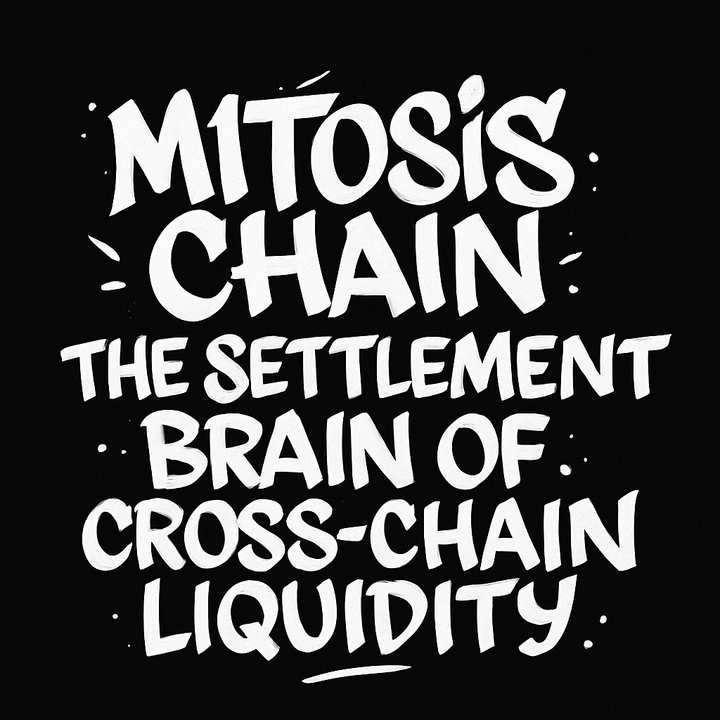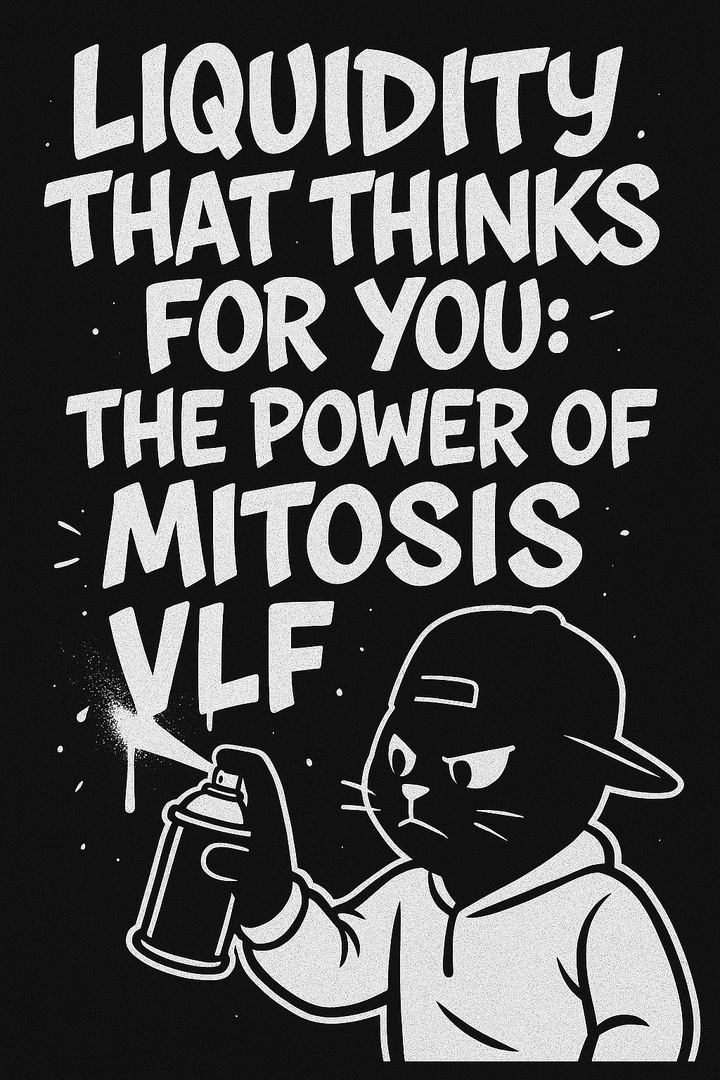Guardians of Networks in Decentralization: The Role of Validators in Securing Mitosis and the Modular Future

Introduction
In the decentralized world of blockchain, trust doesn’t come from institutions, it comes from math, consensus, and a global network of independent participants. At the heart of this system are validators, the unsung heroes who secure transactions, maintain the integrity of the chain, and ensure that no single entity holds the reins of control.
As Web3 infrastructure evolves, validators are no longer limited to a single function or layer. They now operate across a growing stack of modular components from execution layers to data availability and settlement chains. And in this new modular paradigm, platforms like Mitosis are charting a new path forward.
With its recent announcement of genesis validator applications ahead of its mainnet launch, Mitosis is doing more than bootstrapping a network, it’s inviting a new generation of validators to help define the very rules of a modular, multi-chain future.
But what does it really mean to be a validator in this context? How do the responsibilities differ from traditional chains like Ethereum or Cosmos? And why is this moment especially significant for long-term believers, node operators, and ecosystem contributors?
In this article, we’ll unpack the evolving role of validators in Web3, examine how Mitosis is redefining participation through modular architecture, and explore why becoming a genesis validator on Mitosis could be one of the most high-leverage contributions to a future-proof network.
Whether you’re a seasoned operator or a curious community member, this is your blueprint to understanding the power, purpose, and potential of validators in the modular age.
What Validators Actually Do
To understand the role of validators, it helps to think of them as the guardians of blockchain consensus. They perform the crucial task of verifying that every transaction on the network is valid, honest, and adheres to protocol rules. Without them, blockchains would be little more than open databases vulnerable to spam, fraud, and central manipulation.
Let’s break down the key responsibilities of validators in any proof-of-stake (PoS) system and why they matter.
1. Transaction Validation and Block Production
At the core, validators take pending transactions from the mempool and bundle them into new blocks. They ensure that:
- The sender has sufficient balance.
- The transaction is properly signed.
- The action (transfer, smart contract call, etc.) follows network rules.
Once validated, they broadcast this block to the network, where other validators confirm its correctness. If enough validators agree, the block is finalized and added to the chain.
2. Participating in Consensus Mechanisms
In proof-of-stake and its variants (e.g., delegated PoS, liquid staking), validators participate in the consensus protocol, the mechanism that determines which block gets added next.
This involves:
- Voting on block proposals.
- Committing attestations to ensure chain consistency.
- Preventing forks or reorgs through majority agreement.
Each validator’s influence is weighted by the amount of tokens staked (either their own or delegated by others), creating an economic incentive to act honestly.
3. Securing the Network Against Attacks
Validators are the first line of defense against double-spends, spam, and Sybil attacks. Their continued performance and honesty ensure:
- High uptime and network liveness.
- Accurate state transitions (no tampering).
- Rapid finality for users interacting with the chain.
If a validator misbehaves for example, by signing conflicting blocks or going offline frequently they can be slashed, losing part of their stake and reputation.
4. Distributing and Earning Rewards
In most PoS networks, validators are compensated for their services. Rewards can come from:
- Block production incentives (newly minted tokens).
- Transaction fees from users.
- Delegator commissions, if they manage stakes on behalf of others.
Validators must balance performance with trust: reliable validators attract more delegations and earn higher rewards over time.
5. Enabling Governance and Ecosystem Upgrades
Many networks assign governance rights to validators. This includes:
- Voting on protocol upgrades.
- Approving parameter changes (e.g., gas fees, inflation rates).
- Allocating treasury funds or grants.
In essence, validators often act as both technical and political stewards of a blockchain safeguarding its rules, but also helping to evolve them as needed.
Why Validator Roles Are Evolving in Modular Blockchains
The first generation of blockchains like Bitcoin and Ethereum were built as monolithic systems. That means consensus, data availability, execution, and settlement were all tightly packed into a single layer. While this architecture was sufficient to prove decentralization at scale, it posed serious limitations around flexibility, scalability, and specialization.
Enter the modular blockchain thesis an idea that core blockchain functions should be separated into distinct, composable layers. This approach has exploded in popularity with projects like Celestia (data availability), EigenLayer (restaking security), and now, Mitosis which is a modular execution platform that brings flexible architecture and enhanced validator utility to the table.
In a modular world, the role of a validator is no longer confined to block production. Let’s explore how their responsibilities are evolving.
1. Validators as Orchestrators Across Layers
In modular networks, validators may participate in multiple layers simultaneously:
- Execution Layer: Validating transactions and running state machines (e.g., smart contracts).
- Consensus Layer: Participating in the agreement mechanism that finalizes blocks.
- Data Availability Layer: Ensuring data is stored and retrievable for historical verification.
- Settlement Layer: Anchoring transaction outcomes to a base layer like Ethereum.
This creates a broader scope for validators, allowing them to secure multiple chains, offer specialized services, and earn cross-chain rewards — all with a shared or restaked capital base.
2. The Rise of Validator Optionality
In monolithic chains, validators are usually constrained by the base protocol:
- Same consensus engine.
- Same staking logic.
- Same execution environment.
With modular chains like Mitosis, validators have optionality:
- Choose which rollups or appchains to validate.
- Select execution environments (e.g., MoveVM vs EVM).
- Operate under different reward structures and slashing conditions.
This shifts the role from passive validator to active infrastructure provider customizing hardware, software, and delegation strategies to maximize yield and impact.
3. Increased Demand for Validator Specialization
As modular ecosystems grow, different chains have different needs:
- Some rollups may require high throughput and low latency (ideal for DeFi or gaming).
- Others may emphasize privacy or zero-knowledge proof verification (ZK-rollups).
- Data availability chains demand high storage bandwidth and uptime.
This has created a market for specialized validators those who optimize for specific performance metrics, compliance requirements, or user geography.
4. Restaking and Economic Stacking
Protocols like EigenLayer and Mitosis introduce restaking, where validators use their staked assets to secure multiple networks simultaneously.
Benefits include:
- Capital efficiency (earn multiple rewards from the same stake).
- Shared security (bootstrapping new networks using existing validator sets).
- Alignment across ecosystems (validators have skin in the game across protocols).
In Mitosis, this concept is further extended via its DNA Program which we’ll explore shortly to reinforce long-term validator loyalty and performance.
5. Governance in a Modular World
Modularity enables governance at multiple levels:
- Base layer governance (e.g., Ethereum).
- Appchain or rollup-specific governance (e.g., Mitosis rollups).
- Validator coalition governance (shared service providers, infrastructure DAOs).
Validators are increasingly becoming delegates, DAO voters, or contributors to public goods funding. The scope of influence has broadened from "just keeping the lights on" to actively co-shaping the future of the chain.
TL;DR: Validators Are Becoming Protocol Entrepreneurs
In this new paradigm, validators are no longer background operators. They are:
- Multi-layer service providers.
- Governance actors.
- Incentive architects.
- Infrastructure entrepreneurs.
Mitosis is building this vision into its protocol architecture and by opening up genesis validator applications, it’s giving early participants a seat at the table before the network hits mainnet.
Becoming a Genesis Validator on Mitosis
The launch of a new blockchain is a defining moment not just for the protocol team, but for the community of participants who choose to support and secure the network from day one. These early supporters known as genesis validators play an outsized role in shaping the chain’s stability, credibility, and decentralization.
With Mitosis opening up applications for its genesis validator cohort, a rare opportunity emerges: to be part of the foundational layer of a modular blockchain built for builders.
So what does it take to become a genesis validator on Mitosis? And what’s at stake?
1. The Significance of Genesis Validators
Genesis validators are the first cohort of node operators responsible for:
- Bootstrapping the initial security of the chain.
- Participating in network-wide test phases and audits.
- Establishing performance benchmarks and uptime expectations.
- Acting as early voices in governance and ecosystem alignment.
Beyond technical participation, they also gain:
- Reputation capital — credibility as a trusted node operator.
- Influence — a say in protocol decisions, often before governance is fully decentralized.
- Early incentives — access to initial token distributions, validator-specific airdrops, or exclusive staking rewards.
2. Why Mitosis Is Taking a Unique Approach
Unlike traditional chains that often require large minimum stakes or centralized whitelisting, Mitosis is designing its validator onboarding to align with the network’s DNA values:
- Long-term commitment over short-term farming.
- Alignment with modular principles (interoperability, scalability, permissionless deployment).
- Community-first contribution — validators are expected to engage in governance, testing, and feedback.
This ethos is encoded into Mitosis’ DNA Program, which tracks validator contributions over time and rewards participants not just for uptime, but for loyalty, involvement, and community alignment.
3. What You Need to Apply
The requirements to become a genesis validator on Mitosis are both technical and community-driven. While final requirements may be announced via the Mitosis validator docs or Discord, typical expectations include:
Technical:
- Server-grade hardware or cloud infrastructure.
- Ability to run and maintain secure nodes 24/7.
- Familiarity with based chains or modular infrastructure.
Community:
- A history of contribution (in Mitosis testnets, governance, content, etc.).
- Participation in DNA score-building activities.
- A commitment to support builders and educate delegators.
Mitosis isn’t just looking for any validator, it’s looking for ecosystem stewards.
4. The Benefits of Being Early
Becoming a genesis validator isn’t just a technical role, it’s a strategic investment.
Genesis validators may receive:
- Higher staking yields or boosted points during the early phases.
- Increased visibility among delegators, DAOs, and application teams.
- Priority access to upcoming rollups or subchains that require shared security.
- Cross-protocol perks through Mitosis’ modular integrations (e.g., rewards from EigenLayer, Scroll, or other connected ecosystems).
5. How to Stand Out in the Application Process
If you’re serious about becoming a genesis validator on Mitosis, here are a few ways to elevate your application:
- Run testnet nodes consistently and report bugs or improvements.
- Engage with the community on Discord, Twitter, and governance forums.
- Educate others publish tutorials, validator guides, or run support channels.
- Align with DNA metrics — such as early adoption, LP support, or holding Morse NFTs.
Mitosis is rewarding believers — not opportunists.
How Validators Shape Governance and Ecosystem Growth
In many ways, validators are the invisible hands behind the health and direction of a blockchain network. Beyond technical uptime and consensus duties, validators often play a powerful role in shaping the governance, values, and future growth of the protocol they support.
With Mitosis embracing a modular and community-aligned approach, validators aren’t just operators they are stakeholders, architects, and contributors to the entire ecosystem’s evolution.
1. Validators as Governance Actors
In decentralized networks, power doesn’t sit with a foundation or single entity, it sits with the token holders, and more often than not, validators.
Validators typically:
- Vote on protocol upgrades — deciding when to adopt new features, patches, or optimizations.
- Approve or veto parameter changes — like inflation rates, gas fees, or staking terms.
- Propose governance actions — especially if they hold enough stake or delegation.
- Represent community sentiment — via delegate voting or signaling mechanisms.
In Mitosis’ model, validators are expected to participate actively in governance and help shape the early policy and culture of the protocol. This is especially critical as new appchains, rollups, and infrastructure layers build atop the modular stack.
2. Participating in Ecosystem Growth
Mitosis envisions validators not as passive infrastructure, but as ecosystem contributors. That means:
- Hosting RPC endpoints and APIs for developers.
- Providing uptime and security for new rollups.
- Supporting sub-chain deployments with technical assistance.
- Onboarding new delegators, educating users, and running community channels.
In a modular world where chains spin up independently but share infrastructure, validators can serve as bridges between communities, protocols, and user groups.
conclusion
As blockchain infrastructure continues to evolve, so too does the role of validators. What began as a simple function of confirming transactions has expanded into a multi-faceted responsibility encompassing governance, education, protocol development, and community stewardship.
Validators are no longer just network operators. In the modular future Mitosis is building, they are architects of integrity helping shape new chains, enabling permissionless experimentation, and anchoring trust across interoperable layers.
With Mitosis opening up its genesis validator program, this isn’t just a technical milestone it’s a cultural one. It’s a call to action for those who don’t just want to profit from crypto, but help build its future.
The DNA Program makes that vision tangible: rewarding belief over opportunism, commitment over hype. It aligns incentives for the long haul and invites contributors into a network where their efforts won’t be diluted, but magnified.
For developers, Mitosis offers modular flexibility.
For users, it promises scalability without compromise.
And for validators? It offers the chance to be part of something foundational to shape a network’s DNA from the genesis block forward.
Whether you're a seasoned node operator, a new validator looking to grow, or a community member curious about how these systems work now is the time to pay attention. The role of validators is expanding, and in protocols like Mitosis, it's being completely reimagined.
This isn’t just about staking. It’s about serving the next internet a modular, permissionless, and trust-minimized future where validators aren’t background players, they’re frontline architects.



Comments ()